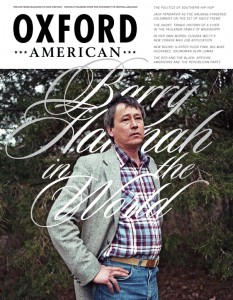It is difficult—nigh impossible—for me to contain my surprise when, in heated talk of great American writers, Barry Hannah fails to surface. Such happened amidst a recent conversation with a friend. We were discussing at length great books and writers who have largely flown under the radar and when I broached Hannah my fellow conversant turned curious. She’d never heard of the man or his many good works. So I went into my routine. I thrashed and barked. I got guttural. Not only was Hannah one of the greatest American writers, I told her, he was perhaps the most loving. I handed over Hannah’s The Tennis Handsome and told her to let me know her thoughts. But since we’re on the subject, here are mine.
 A strong argument could be made for Hannah to be ranked among the very best America has ever cultivated if for nothing save the depth of love present in his stories. His characters need it, seek it against dire circumstances. The whupping Levaster puts on French Edward at the beginning of The Tennis Handsome is not purely selfish, productive. It’s as much about pity, remorse, as it is the clobbering of the soft-brained tennis pro. Levaster needs Edward as much as us. He’s less a foil than a co-conspirator in the comic drama, the conduit for Levaster’s electricity. No wonder lightning strikes him dead on, gives him strange new wits, canny thoughts. Edward acts on our impulses. We’re often Levaster, like it or not, prodding the tennis prodigy on to haphazard glory. We want him to win because we love the man regardless of the density of his soggy brain. Don’t we too often have heads full of river water, days of foggy acquiescence? There’s a little French Edward in us, too. Maybe more than a little. Hannah’s loving craft gets right down to the truth roots of fiction. His loving shapes us as much as his characters.
A strong argument could be made for Hannah to be ranked among the very best America has ever cultivated if for nothing save the depth of love present in his stories. His characters need it, seek it against dire circumstances. The whupping Levaster puts on French Edward at the beginning of The Tennis Handsome is not purely selfish, productive. It’s as much about pity, remorse, as it is the clobbering of the soft-brained tennis pro. Levaster needs Edward as much as us. He’s less a foil than a co-conspirator in the comic drama, the conduit for Levaster’s electricity. No wonder lightning strikes him dead on, gives him strange new wits, canny thoughts. Edward acts on our impulses. We’re often Levaster, like it or not, prodding the tennis prodigy on to haphazard glory. We want him to win because we love the man regardless of the density of his soggy brain. Don’t we too often have heads full of river water, days of foggy acquiescence? There’s a little French Edward in us, too. Maybe more than a little. Hannah’s loving craft gets right down to the truth roots of fiction. His loving shapes us as much as his characters.
Even the most vile of Hannah’s characters—Man Mortimer, villain of Hannah’s last novel, Yonder Stands Your Orphan, for example—desire it, this love, the balm to their poisonous beings. But it is a warped love, deranged, stretched and rubbery over circus tent souls, folk who have no right idea how to get it across, communicate. Levaster’s late-night forays into Central Park, his burning need to confront villainy amidst the trees, the dirt, hearkens back to Southern fiction’s struggle to move from the rural to the urban. Edward’s dangerous play with the crossbow is little different. Love so potent runs the risk of spoiling, curdling like milk left sitting. It’s a journey perilous, the kind defined by the Snopes, by Hazel Motes. Yet unlike Faulkner’s and O’Connor’s characters, the journeys undertaken by Hannah’s characters are not voyages of destruction, pilgrimages of religious catharsis. Theirs are the movements of the loony in love, the moon smoochers who know, the great swaying love made possible through strife. They’re too real for me sometimes. I sit abashed that the man much less his characters might succeed when I often fail to find the words to communicate the pitch of my own combat.
Mostly it’s a warped love because it is not pure. I’m not sure a pure love exists in Southern fiction—it’s the tradition, the Antebellum promise, mythic. It’s present on Levaster despite his many shortcomings, his dark needs, and it’s certainly present on French Edward though the book might easily have treated him as nothing more than a buffoon. Yet he is held up to us, a model of sorts, not only in body but in simplicity of purpose and at times of generous feelings of the heart, a battery of good feelings. Both Edward and Levaster love and are loved by the author, by us. That was Hannah’s plan all along. He served it up, made sure we had our fill, and didn’t leave us wanting.
How about that? Hannah loves his readers as much as his characters.
Three days later my friend returned, book in hand. She told me she’d devoured it, wanted to know what she ought to next read. I was pleased, informed her that a strong dislike or even slight impartiality would have been grounds for immediate dissolution of the friendship. Just about meant it, too. That good love Hannah teaches, it’s not always easy to locate, nurture. I think that’s the point. We got to fight it out the way Baby Levaster and French Edward fought it out, got to get in the dirt and roll around to know what it is we’re mucking up with our ungainly wants, our bad habits. We chew our nails, we spit. We’re bad all through.